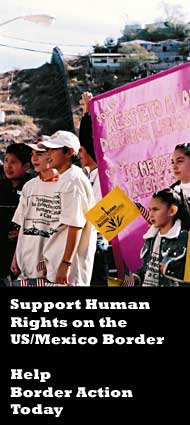For the last several weeks, I have been rendered pretty much mute by the sheer scale of injustice, corruption, cynicism, and, yes, treason, represented by the US establishment's response to illegal immigration.
There've been days when I've gone totally silent, days when I've wondered what possible good it can do to write one more post pointing out one more stupendous act of cruelty or one more boggling transgression of the US Constitution and Bill of Rights. It has sometimes seemed useless, a flailing in gale force hurricane winds. There are times when I still feel that way, and there will be times like this again.
I don't ask for forgiveness and certainly not for consolation. It's not about that. If there's any point in writing about this, it's to chronicle the everyday collateral effects of evil.
I've been thinking about this subject a lot in my flight into silence. Not thinking well, perhaps, but processing nonetheless, sometimes consciously, sometimes in the dark recesses of my brain.
A documentary called "The Sorrow and the Pity" has helped me to focus somewhat. I've been told that it's the most famous documentary in film history, and that General Charles de Gaulle himself, leader of the Free French movement and later French President, banned it from France.
It doesn't shame me to admit that I hadn't heard of it. For one thing, I was a twenty-something with other things on my mind when it came out, and I was exploring them in Europe without aid of a television. For another, there must be a google of things I've never heard of. Who's counting?
"The Sorrow and the Pity" is about the German occupation of France in WWII, filmed from the perspective of men and women who were there, then.
Certainly it doesn't parallel our contemporary response to immigration in any way. However, in its encyclopedic portrayal of the human response to evil, it serves, perhaps, as a warning that no one and no country is immunized from complicity. When evil on the scale of the Holocaust occurs, when evil on the scale of global trade and the rape of low-wage Latino immigrants takes place, it's because most of the people there at the time comply. Comply: Complicity.
What "The Sorrow and the Pity" reveals is the timeless, free-radical nature of evil, and something very like a genetic template for governing human response.
There are the mundane dime-a-dozen clueless, absorbed by two-year-olds or taverns or soccer or Gaulois and boules, or what you will. There are the picayune petit bourgeois who are fine with it if they can but sell another round of cheese. There are the clergy, ranked by degree of complicity or resistance. There are the enraged ineffectual; the enablers; the sexual hangers-on; the Leftwing militant; the go-to-ground who hope just to be let alone; the closet sympathizers; the social, mental, intellectual, and emotional defectives; the genuine heroes; the consolers; the mockers; the ones who flee. There are the political elites, the intellectual elites, the churchmen, and the healers. There are the animals, helpless equally in the slaughter or the flight.
They are we. Surely by now that is clear?
What remains to be driven into the resistant, distracted, denying, or oblivious skulls of Americans today is that what is going on in the official US response to illegal immigration is the prelude to a police state. In future posts, I will try to explain what I see, but for now, "immigration" is a laboratory in which all the instruments of fascist, police state repression are being tested, honed, refined, polished, and piloted.
What is going on in "immigration" is but a preview of things to come unless we decide otherwise, now. Unless we are willing to see and then to act, we'll soon see organized labor, homosexuals, feminists, Leftists, and constitutionalists "addressed" in equivalent ways. I'm not the first to say so. Wiser persons than I have been warning us for fifteen years or more.
As I've said, this subject can be overwhelming at times to those of us brought up softly. But it can also be energizing, empowering, reminding us through others' suffering that freedom wasn't forever guaranteed us by our fathers and mothers.
It can also tap into our strongest and best instincts. May it be so.
We can't let Latinos' suffering be in vain.
Monday, August 4, 2008
The Sorrow and The Pity
Posted by
PICO
at
8/04/2008 06:31:00 PM
![]() Labels:
" WWII,
American fascism,
immigration,
Postville IA
Labels:
" WWII,
American fascism,
immigration,
Postville IA
Subscribe to:
Post Comments (Atom)



















0 comments:
Post a Comment